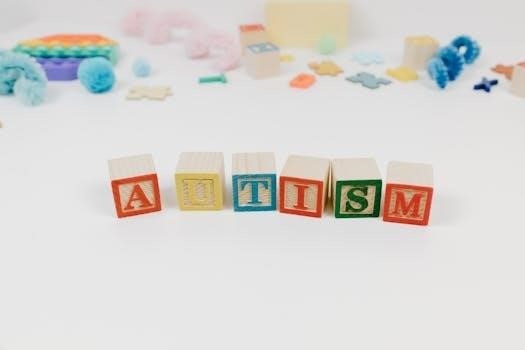
life skills for autism pdf
Life skills are essential for greater independence, resilience, and social integration for individuals with Autism Spectrum Disorder (ASD). These abilities enable successful navigation through daily life with self-confidence.
Understanding the Importance of Life Skills
Mastering life skills is crucial for building self-esteem and confidence, while also gaining autonomy. For individuals with autism, explicit instruction and repetition are often needed to acquire these skills. These skills form the foundation for independence, allowing individuals to identify their needs and employ coping strategies. Connecting with others and building relationships are vital aspects that contribute to overall well-being and support networks. Life skills empower individuals to care for themselves, interact, and thrive in various environments, ultimately enhancing their quality of life.
Functional Life Skills Defined
Functional life skills are the everyday tasks needed to live independently. These skills enhance self-esteem and confidence, providing autonomy. Explicit instruction and repetition are often necessary for those with autism.
What are Functional Life Skills?
Functional life skills are the abilities a person requires to live and work as independently as possible. These skills are considered functional when they support and improve an individual’s level of independence. For some, this might include personal care, while for others, it could involve using public transportation. Mastering these skills builds self-esteem and confidence. Explicit instruction is often necessary for individuals with autism, emphasizing the importance of repetition and tailored teaching methods to help them achieve autonomy in their daily lives.
Teaching Methods for Life Skills
Video modeling, individualized instruction, and visual supports are effective methods for teaching life skills. Consider individual interests, preferences, and sensory needs while teaching.
Individualized Instruction and Visual Supports
Individualized instruction is key, considering each person’s unique interests, preferences, and sensory needs when teaching life skills. Visual supports, such as schedules and checklists, are beneficial tools. Breaking down complex routines into smaller tasks with visual aids aids understanding. These tailored methods, combined with video modeling, help individuals with autism visualize skills and their expected outcomes. This approach fosters a deeper comprehension and promotes skill acquisition through personalized and structured teaching. These methods can greatly enhance the learning process for individuals with autism.

Checklists for Life Skills
Checklists are valuable tools for families and schools to track progress in life skills. These provide a structured framework to assess and enhance skills, encouraging collaboration.
Using Checklists to Track Progress
Employing checklists offers a structured method for monitoring the development of life skills. These tools help identify areas where progress is being made and where additional focus might be needed. Checklists can be personalized to align with individual goals and abilities, making them a versatile resource. By systematically tracking progress, families, educators, and therapists can ensure that interventions are effective. Regular review of these checklists allows for adjustments to teaching strategies. This approach fosters a sense of accomplishment and encourages continued learning and development. Checklists also promote collaboration among team members.
Key Areas of Life Skills
Essential life skills include self-care activities, communication, and social interaction. These areas are vital for daily living, community participation, and building relationships with others.
Self-Care, Communication, and Social Skills
Self-care encompasses personal hygiene, dressing, and healthy habits. Communication skills involve expressing needs effectively, listening, and responding appropriately. Social skills are crucial for interacting with others, making friends, and understanding social cues. These areas enable individuals to navigate daily life and build meaningful relationships. Mastering these skills enhances independence and promotes a higher quality of life for those with autism, allowing them to engage more fully with the world around them and achieve greater success in all areas of their lives.
Transition to Adulthood
Transition services guide individuals with autism toward independent living. Life coaching can be beneficial, offering support in various life skills. These services help navigate post-school life effectively.
Transition Services and Life Coaching
Transition services are crucial for individuals with autism as they move into adulthood, focusing on independent living skills. These services often begin by assessing needs using tools like the Modified Adolescent Autonomy Checklist. For those who have aged out of school, life coaching provides personalized support. While life coaching can be costly, funding options may be available through entities like DDS. Resources such as LifeMAP, through the Asperger Autism Network, offer valuable support during this transition period. The goal is to help individuals achieve greater autonomy and navigate adult life successfully.

Coping Skills and Stress Management
Learning coping skills is vital for managing stress, especially during transitions. Identifying needs enables individuals to use appropriate coping strategies, fostering independence and well-being. Connecting with others is also a huge support.
Strategies for Managing Stress
Developing effective strategies for stress management is crucial for individuals with autism as they navigate daily life. These strategies can include identifying triggers, practicing relaxation techniques, and engaging in preferred activities. Learning to recognize when stress is building and proactively employing coping mechanisms can significantly improve emotional regulation. Furthermore, structured routines and predictable environments can contribute to reducing anxiety and promoting a sense of calm. Participating in camps designed for teens with autism can also help in developing these vital skills.

Community Participation and Supported Living
Guidance for community integration and supported living is essential for adults with autism. These services promote independence and inclusion, enhancing their quality of life through various supports.
Guidance for Community Integration
Community integration for individuals with autism involves creating opportunities for meaningful participation in various settings. This includes accessing public transportation, engaging in recreational activities, and utilizing community resources. Supported living arrangements, such as group homes or supervised apartments, provide a structured environment while fostering independence. Effective strategies involve individualized planning, consistent support, and collaboration with community organizations to ensure successful integration. These supports aim to help individuals with autism lead fulfilling lives while actively engaging with their communities, promoting both inclusion and independence.

Utilizing Visual Aids for Instruction
Visual aids are beneficial for teaching life skills to individuals with autism. Breaking down routines into smaller tasks using visual checklists and schedules can be very helpful.
Visual Schedules and Task Breakdown
Many individuals with autism benefit significantly from visual supports. Creating visual schedules helps to structure daily routines, providing clarity and predictability. Breaking down complex tasks into smaller, manageable steps makes learning easier and reduces anxiety. This approach uses checklists, which can guide individuals through each stage of a task, promoting independence. Visual aids allow for a clearer understanding of expectations and sequences, which is often essential for skill acquisition and development. The use of visuals can also help to improve overall communication.
Importance of Early Intervention
Teaching life skills early is crucial for raising a person with autism. Early intervention helps build a strong foundation, breaking down daily routines into manageable steps.
Building a Foundation for Independence
Early intervention in life skills development is paramount for individuals with autism, as it lays the groundwork for future independence. Starting early allows for the gradual introduction and reinforcement of essential skills, increasing the likelihood of successful transitions into adulthood. By breaking down complex tasks into smaller, more manageable steps, early intervention fosters a sense of accomplishment and promotes self-reliance. Focusing on building these foundational skills from a young age empowers individuals with autism to navigate daily life with greater confidence and autonomy, setting the stage for a more fulfilling and independent future.